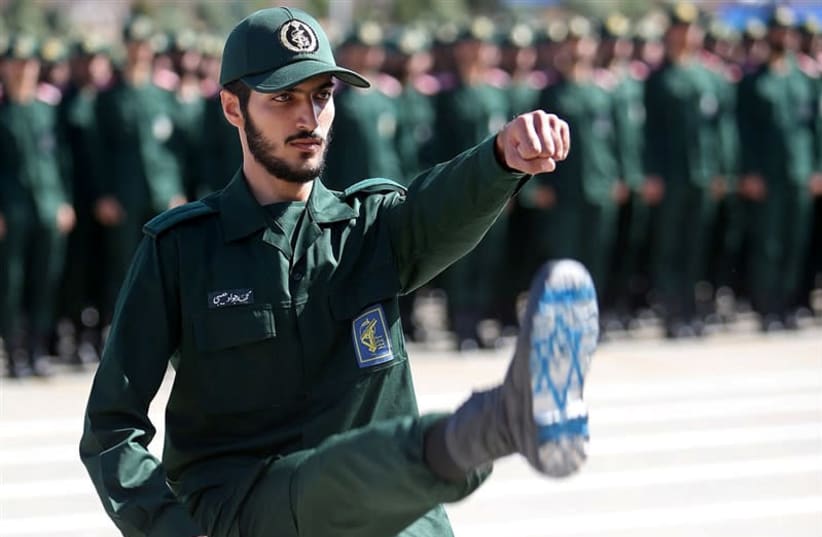Iran and Israel shared a war of words on Sunday after Regional Cooperation Minister Tzachi Hanegbi claimed in an interview on Sunday that Israel has been the only country killing Iranians.
“For two years now, Israel has been the only country in the world killing Iranians,” the Likud minister and member of the security cabinet told Army Radio. “We have hit the Iranians hundreds of times in Syria. Sometimes they admit it, sometimes foreign publications expose the matter, sometimes a minister, sometimes the chief of staff. But everything is a coordinated policy.”
Hanegbi added that “The Iranians are very limited in their responses, and it’s not because they do not have the capabilities, but because they understand that Israel means business. We are very firm on issues of national security.”
Iran later hit back against Hanegbi’s comments, with PressTV tweeting, “This is how Israelis are freely and proudly talking about killing Iranians, just imagine what would happen if it was the other way around!”
Hanegbi responded to PressTV’s tweet, saying that if Khameni and Rouhani “were very insulted,” he had a “creative idea” for them to make Israel stop striking their targets in Syria.
“I saw that the murderous regime in Iran did not like that I mentioned this morning that for two years the IDF has been charging a heavy price for their unrelenting aggression against Israel,” he tweeted.
“So I thought of a creative idea that could ease Iran’s sensitive soul: You will stop placing surface-to-surface missile batteries, UAVs, bases of Shi’ite militias and terrorist infrastructures on Syrian territory, aimed at killing Israelis...You will stop arming Hezbollah and the Islamic Jihad with deadly offensive weapons aimed at killing Israelis. When that happens, we will no longer have to destroy Iranian terrorist organizations and there will be no more Iranian casualties. Understood?”
Also on Sunday, Iraqi Prime Minister Adel Abdul Mahdi has ordered an investigation into a strike against a base of the Hashd al-Shaabi – also known as the Popular Mobilization Forces (PMF) – this past weekend.
The strike against the base in the northern Iraqi province of Salaheddin reportedly killed several Iranian and Hezbollah terrorists. Iran later denied that any of its forces were killed in the strike, and that only two had been injured.
While initial reports suggested that the strike was carried out by a drone, a PMF media official told the London-based Asharq al-Awsat that it was still unclear due to the extent of damage.
“We must await the results of the probe to find out what type of aircraft carried out the strike,” the unnamed official was quoted as saying, adding that “the strength of the rocket indicates that it was probably not fired by a drone.”
The attack has not been claimed by any party, and the US denied being behind the strike. The US-led anti-ISIS Coalition also denied involvement, putting out a statement saying that they were aware “of an attack against the Iranians and a Popular Mobilization Force unit in Salah ad Din [governorate]. Coalition Forces were not involved, and we have no further information at this time.”
While Israel has also remained silent, both Israel and the US have warned that Iran and its proxy militias are the biggest threats to peace in the region, and hope to weaken the Islamic regime’s growing influence across the Middle East and Persian Gulf.
Israel has warned repeatedly that it will not allow Iranian presence in Syria, and has admitted to perpetrating hundreds of airstrikes, preventing the transfer of advanced weapons to Hezbollah that included surface-to-air missile kits.
It is believed that Iran is attempting to entrench itself in Iraq, a mainly Shia country, as it did in Syria, where it has established and consolidated a parallel security structure.
While there have been no reports of strikes in Iraq attributed to Israel, the Jewish State is reported to be behind an airstrike on the Syrian-Iraqi border last year near the town of al-Bukamal, which killed 22 terrorists of a Shi’ite militia.
Iraqi troops have been working with the PMF in the fight against Islamic State terrorists in Iraq. The PMF – militias that were incorporated into Iraq’s security apparatus in 2016 to fight against ISIS along with Iraqi and Kurdish forces, are directly financed and equipped by Iran.
In September, Reuters reported that Iran had transferred ballistic missiles to Shi’ite proxies in Iraq over the course of several months, and that it is developing the capacity to build more there. The missiles that were said to have been transferred include the Fateh-110 – Zolfaqar and Zelzal type – that have ranges of 200-700 km., allowing them to threaten both Saudi Arabia and Israel.
Jerusalem Post Staff contributed to this report.
